Nobody wants to swim in cloudy pool water. While a clear blue swimming pool is enticing, a cloudy pool is not. Milky or swampy water feels unappealing and sometimes even dangerous. However, leaving your pool water cloudy might not only allow bacteria to breed. It may also damage your pool’s pump and filtration system.
If you pool is cloudy, you’ll need to understand why. You’ll only know how to clear cloudy pool water when you know what has caused this. There are many different approaches to clear a cloudy pool but you’ll only know the option to take when you understand why you have cloudy pool water. Diagnosing your problem is therefore imperative.
This guide aims to show you how to clear a cloudy pool. This will help you to achieve a clear, clean and sparkling swimming pool which is so inviting on a summer’s day.
Once you understand why your pool water is cloudy, you’ll be able to find a solution with ease.
Why is my pool cloudy?
This is probably your first question. Let’s have a look at some of the reasons behind a cloudy pool:
Before understanding what has caused your cloudy pool water, take a look at how cloudy your pool actually is.
The water looks flat: this is the mildest form of cloudy water. Your water is colourful but feels dull. Your pool has clarity but no sparkle. This is the mildest form of cloudy pool water.
Your water is hazy: when your water is hazy, it is not completely milky but it is not completely transparent either. It’s starting to lose its colour and you would not be able to see a coin if you dropped it onto the bottom of your pool.
Your water is milky: This is the most severe form of cloudy water. When your water is milky it has become completely opaque and you are not able to see the pool floor at all. This is the most severe form of cloudy pool water.
Your pool chemicals are imbalanced
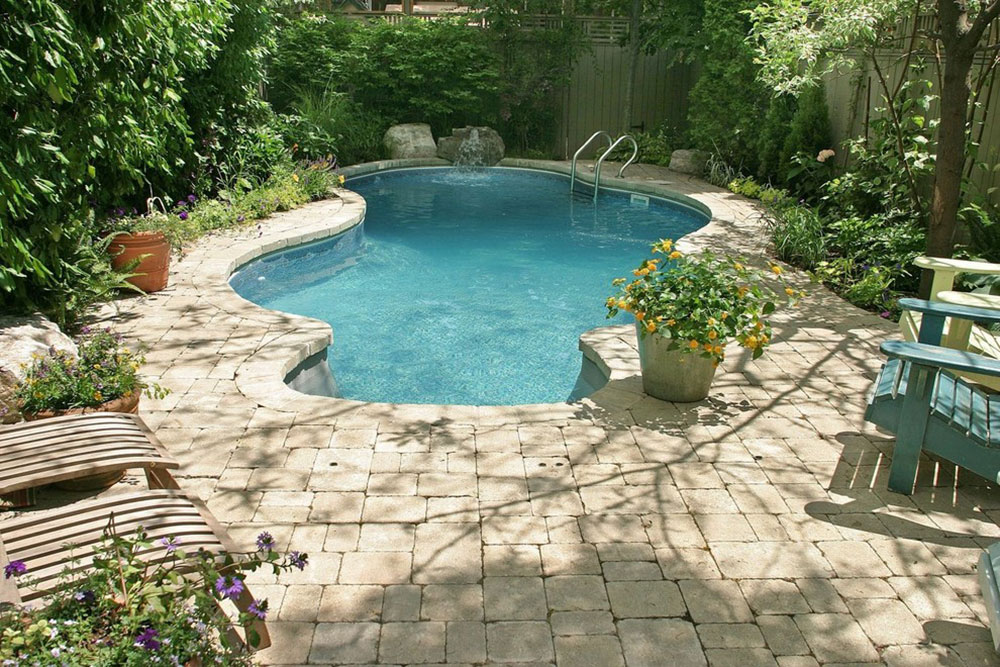 Image source: Betz Pools Limited
Image source: Betz Pools Limited
In order to keep your pool water clean and sparkling, you will need to ensure that your pool chemicals are properly balanced. Checking your Ph balance as well as your chlorine levels will help you to assess if your pool chemicals are out of balance, causing cloudy pool water.
Check your pH: the pH range extends from 0 to 14 and 7 is considered to be neutral. A swimming pool’s pH balance can range between 7.2 and 7.6, with 7.4 being the optimal. This range is approximately the same pH level as tears. This makes it comfortable for human eyes. A pH balance below 7 is considered to be too acid. Chlorine is at its optimal when pool pH is completely balanced.
Although your pool’s pH level is not connected to a cloudy swimming pool, when your pool’s pH is unbalanced your swimming pool water will be cloudy because it renders chlorine ineffective. When chlorine does not work properly, algae and bacteria will begin to build up in your pool.
Chlorine:Your chlorine levels should remain between 1 – 3 parts per million in a private swimming pool. In a commercial swimming pool, you’d need your chlorine levels to be at between 2 and 5 parts per million (ppm) due to heavy use.
Alkalinity:The alkalinity level in your pool will help to keep your pH level stable. When your alkaline balance is out in your pool, you’ll experience rapid pH changes, which will render your chlorine ineffective. As a result you’ll end up with a cloudy swimming pool. Fibreglass, painted or vinyl pool would need an alkalinity of between 100 and 140 ppm. A traditional swimming pool would need a ppm of between 80 and 120 bicarbonate alkalinity.
Calcium hardness: if your calcium hardness is imbalanced, you could end up with a cloudy swimming pool. Calcium hardness needs to be balanced in order to create a chemical balance. You’ll need a calcium balance of between 200 and 400 ppm. You can measure your calcium hardness approximately once a month.
Chemical imbalance: high levels of phosphates, bromines and chemicals such as cyan uric acid (CYU) can also create an imbalance in your pool. If you use cyan uric acid in your pool, check that your CYU and chlorine levels remain balanced. CYU can reduce chlorine levels, leading to cloudy water in pools.
If your pool water is cloudy, check out your chemical balance right away. You can do this by buying yourself an easy kit. If your swim pool water is clear and sparkly, remember to check your pool once a week to keep an optimal chemical balance.
Faulty Filter
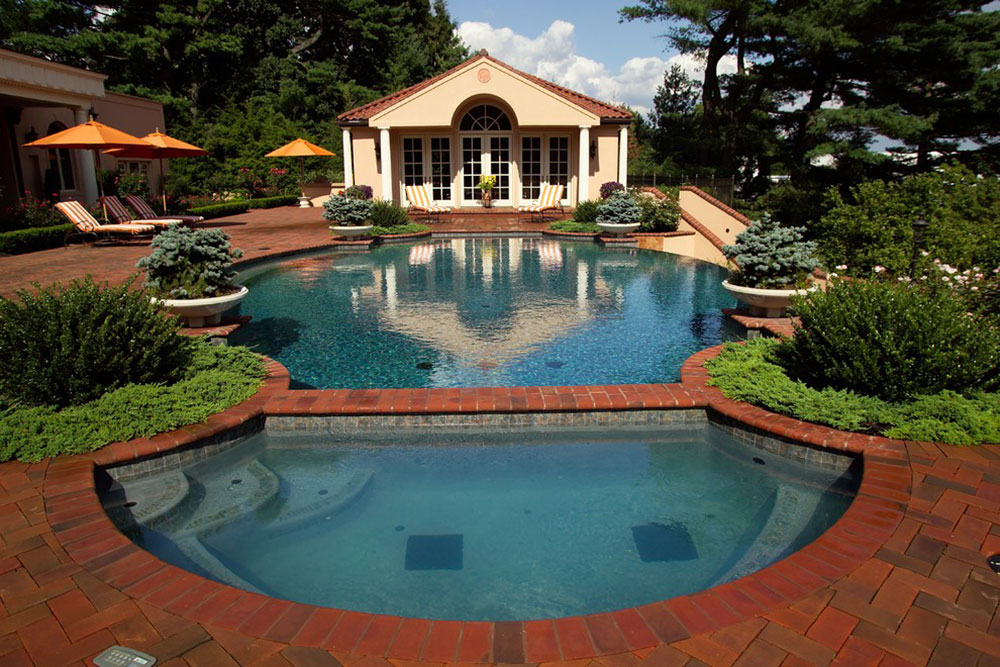 Example of how it should look by SJ Valenza Inc.
Example of how it should look by SJ Valenza Inc.
If your pool is cloudy but chemicals are fine and balanced, you may have a problem with your pool filter. Your pool filter circulates the water through your pool, clearing out dirt and debris in order to create clear pool water. With a faulty filter, you may end up with cloudy pool water.
There are a couple of factors which could effect your filtration system:
Pump size: Your pump needs to be strong enough to circulate water around your pool and push it through the filtration system. Pumps which are not strong enough will result in a green cloudy pool.
Running time:If your pump is strong enough to filtrate your water system, you will need to leave your filtration system on for long enough for all the water to circulate completely. All of the water needs to circulate through the filtration system before the pump is turned off. Otherwise you will end up with a cloudy swimming pool.
Maintenance: You will need to maintain your filtration system in order to ensure that it runs smoothly. If your system is blocked or broken, you will end up with cloudy swimming pool water. Maintaining your filtration system means cleaning it out, clearing blockages and replacing any broken parts.
Environmental factors and debris
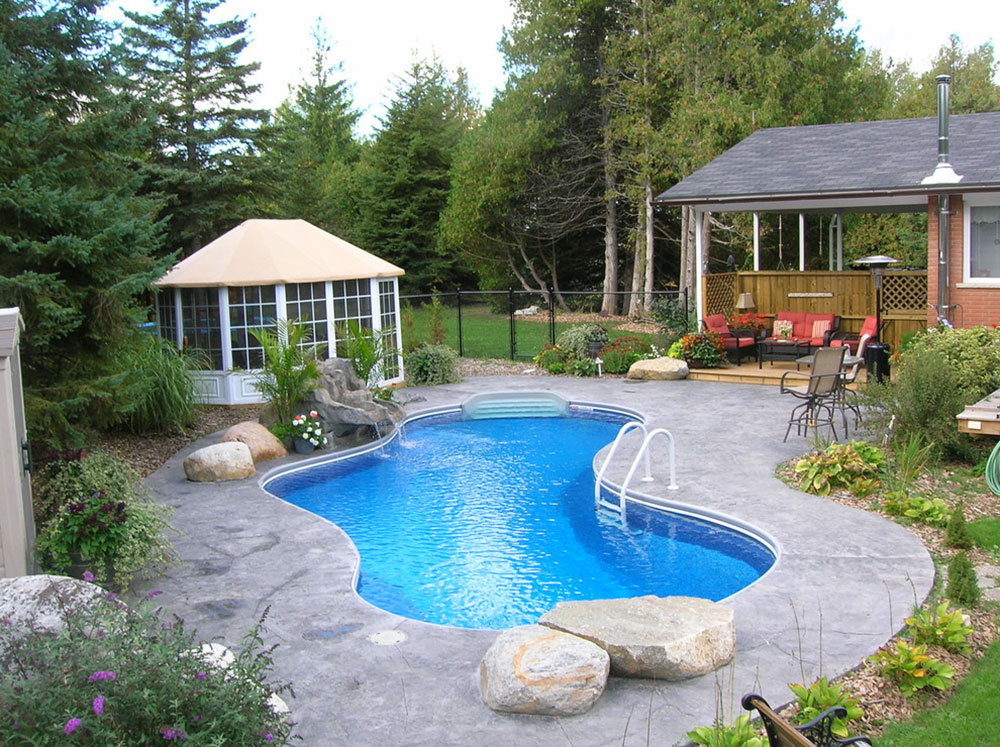 Example of how it should look by Central Jersey Pools
Example of how it should look by Central Jersey Pools
If you have cloudy blue pool water, environmental factors may play a role:
Insects and small animals: small animals and insects may make their way into your pool, blocking up your filter system. If your pool water is cloudy, look out for bird droppings as well.
Leaves and dust particles: leaves may block up your filter system or sink to the bottom of your pool if not removed quickly. However, perhaps the greatest culprit for dirty water is dust. Unless removed regularly, dust can create dirty or cloudy water.
Lots of rain
 Example of how it should look by AT6 Architecture : Design Build
Example of how it should look by AT6 Architecture : Design Build
Although rain water may often seem to be a great source of pure, clean water for your pool, it can leave you with cloudy pool water. This is because even small amounts of rain can disturb the pH balance or chlorine levels in your pool.
Although you cannot cover up your pool every time it rains, try to monitor or test your water after a storm. This will enable you to restore the chemical balance you need to clear up cloudy pool water.
Depending on the area around your pool as well as the slope of your ground, rain water might also allow soil or debris to accumulate into your pool. Skimming your pool will help you to remove dust and debris so that you don’t end up with cloudy pool water.
Your pool’s circulation system
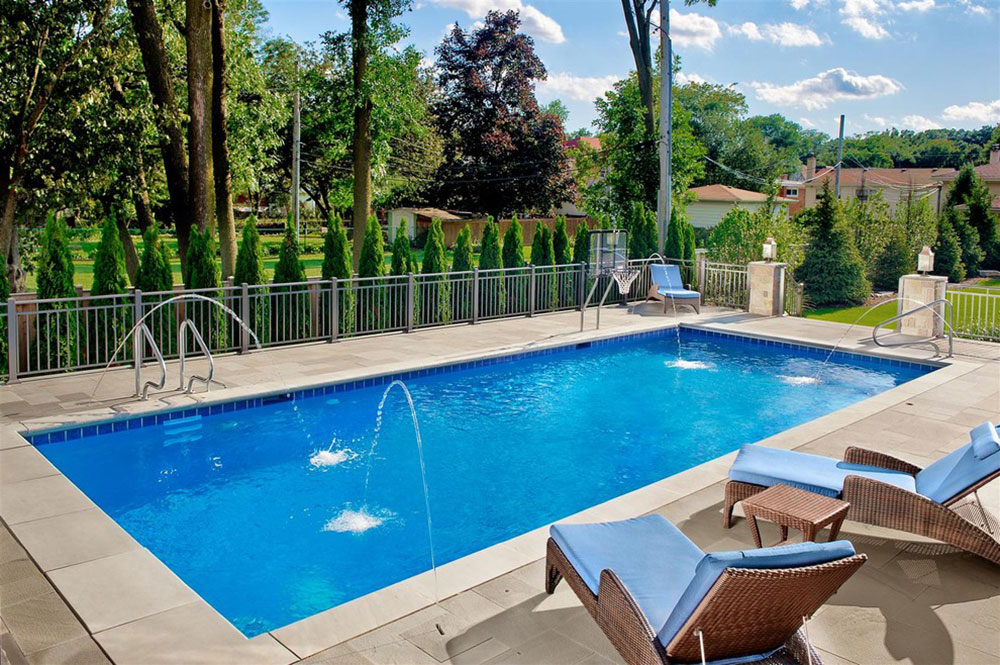 Example of how it should look by Platinum Poolcare
Example of how it should look by Platinum Poolcare
When your pool circulation system is faulty, you will end up with a cloudy swimming pool. Keeping your circulation system running smoothly, along with maintaining your chemical balance is the easiest way to clear a cloudy pool. If your pool water is cloudy and you are wondering how to clear pool water with a perfect chemical balance, it is time to check out your circulation system.
As mentioned earlier, regular maintenance and replacing broken parts will ensure your circulation system runs like clockwork. If your pool circulation system runs for eight hours a day, it will ensure that your pool is free from the dust and debris which cause cloudy pool water. However, you’ll also need to ensure that you maintain your system.
Neglect, a system blocked with debris or chemical imbalances can leave your pool filter system in need of repair. Regular maintenance will create clear pool water.
How to clear cloudy pool water when you have a chlorine imbalance
 Example of how it should look by Total Pool & Patio, LLC
Example of how it should look by Total Pool & Patio, LLC
Chlorine levels in your pool can reduce after a heavy rainfall which dilutes the chlorine in your water. Sunny days with high levels of UV light can break down chlorine in the water. Chlorine levels can also decrease due to heavy pool usage.
If you have an outdoor pool and you worry that UV light will break down chlorine, causing your levels to fluctuate, and if you wish to prevent cloudy pool water, you can always use cyan uric acid. This will keep your chlorine levels stable by preventing them from being depleted by UV light.
However, if you use cyan uric acid, remember to test your pool levels. If you use too much cyan uric acid it will deplete the free chlorine in your water. This will result in green cloudy pool water as it encourages the growth of algae.
What levels should my chlorine reading reflect and how often should I test them?
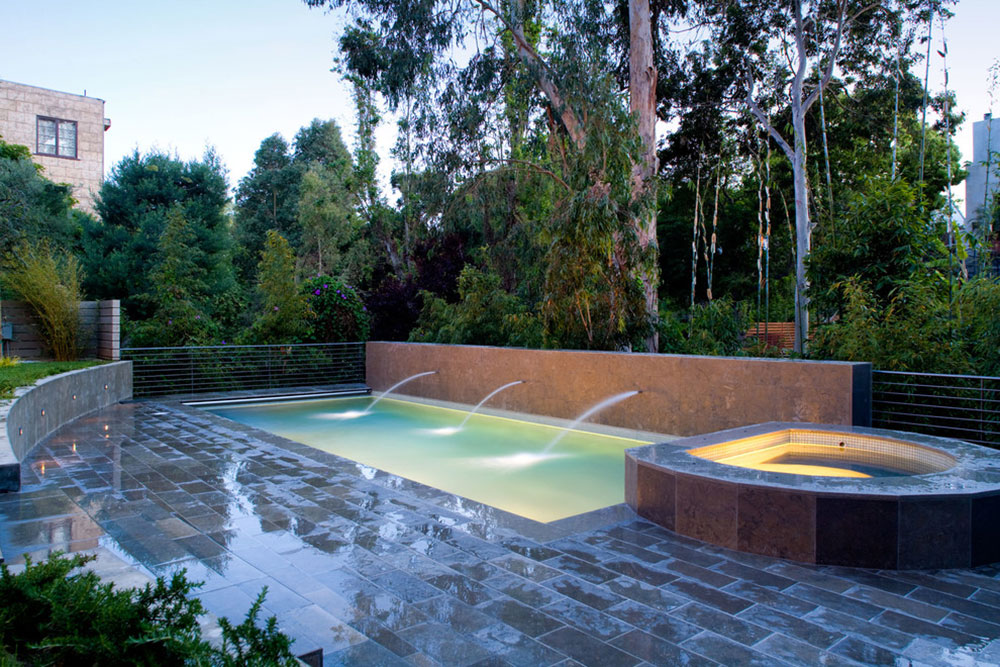 Example of how it should look by Envision Design-Build
Example of how it should look by Envision Design-Build
Your levels of both free and total chlorine should ideally range between 0 and 0.5ppm. If your combined chlorine levels are higher than 0.5ppm you may end up with cloudy pool water. The wider the range between your chlorine levels, the more chlorine will be present in the water. Shock your swimming pool immediately.
If your combined chlorine levels are high, your pool might become unsafe for swimming. During busy seasons it is test your pool everyday to ensure optimal balance. Adjust your pool immediately should you pick up an imbalance. This will help to prevent a cloudy swimming pool.
What should my pH balance be?
Your swimming pool pH balance is best between 7.2 and 7.8, with the ideal range falling between 7.4 and 7.6. This is the pH of human tears, which means the water won’t burn your eyes while you swim.
Using flocculent to clear pool water
If you’ve used pool clarifier, you’ll know it helps you to clear up cloudy pool water by combining all those small particles of debris so they can be removed quickly. Flocculent combines debris in the same manner as a pool clarifier, except that it sends them to the bottom of the pool where they can be vacuumed up. This makes it an effective cloudy pool fix.
Some important points to remember when using flocculent:
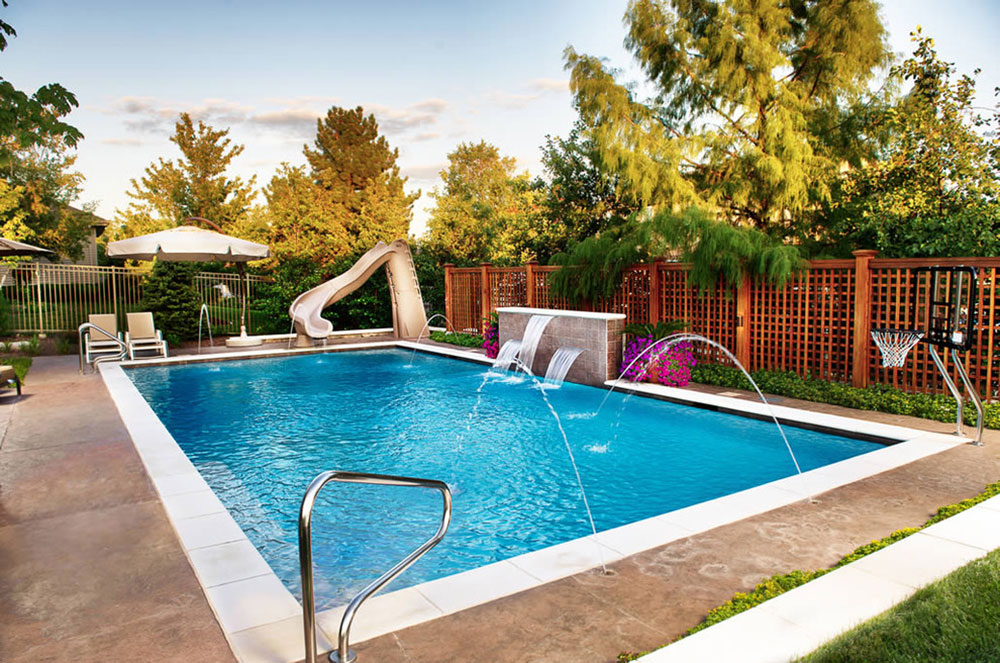 Example of how it should look by Platinum Poolcare
Example of how it should look by Platinum Poolcare
Vacuuming is manual: You won’t be able to use your automatic pool vacuum to clean up the debris. You’ll need to do it manually.
Top up your water: Once you start your vacuuming process, your pool will lose water. To keep water levels consistent it helps to run a hose pipe while you vacuum your pool.
Turn off your filter: While you vacuum your pool, you will be removing debris from the bottom. Keep your pool filter off while you do so. The vacuuming process should take you about half a day and you can turn your pool filter on after it has been completed.
Monitoring pH and pool alkalinity
 Example of how it should look by RD Architecture, LLC
Example of how it should look by RD Architecture, LLC
Your pH levels determine how your pool chemicals will work. You’ll need to monitor your pool alkalinity regularly so that you can achieve the right chemical balance. A pH balance below 7.0 is too low. If your pH balance is too low, you will end up with cloudy pool water.
You will also end up with algae growing in your water. You could also end up with harmful bacteria. If your pH levels are too low, you’ll need to use a pH increaser with soda ash. This will help you to clear a cloudy pool.
Balance your total alkalinity
 Example of how it should look by A. Perry Homes
Example of how it should look by A. Perry Homes
Your swimming pool’s total alkalinity is the total amount of alkaline chemicals in the water. Your total alkalinity range should be between 80ppm and 120ppm. This will mean that your pool has the ability to neutralise acids and keep your pH levels stable. If your pH levels go too high, you will have calcium scaling.
If your total alkalinity levels are too high, you can end up with cloudy pool water. To lower your total alkalinity, add muriatic acid to your swimming pool and then aerate your pool. This will save you from adding a pH increaser as this will increase your total alkalinity too.
Clean your pool filtration system
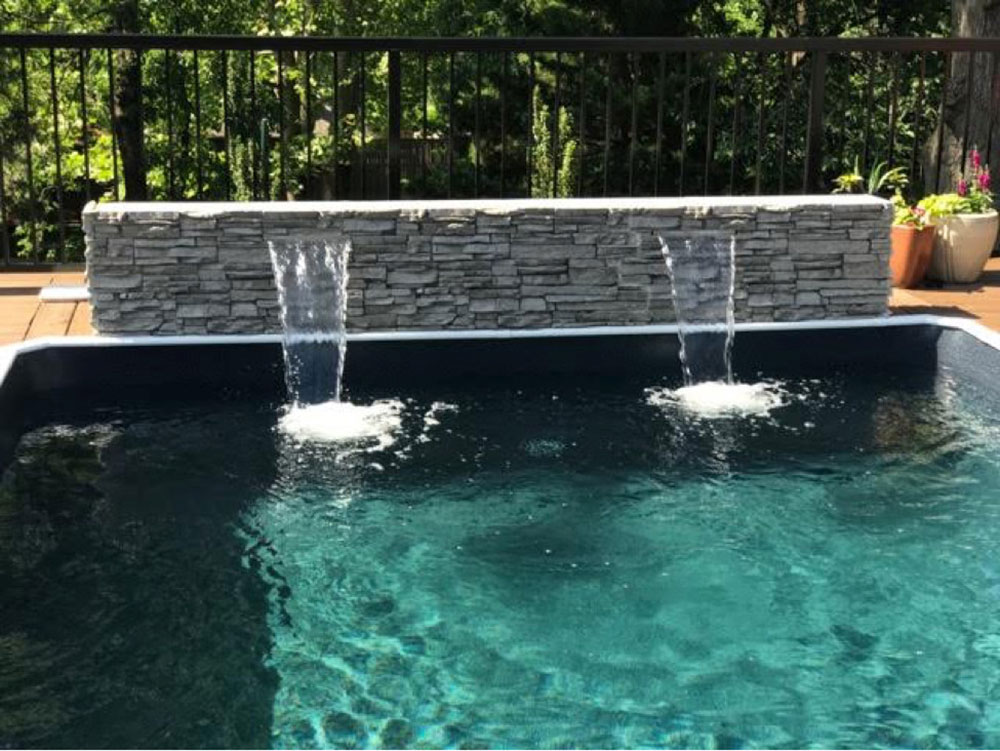 Example of how it should look by Aqua Star – On Ground Pools
Example of how it should look by Aqua Star – On Ground Pools
You will end up with cloudy pool water if your circulation system is not running effectively. This is often the result of debris.
Your circulation system will largely depend on the structure of your swimming pool. Your pool jets (or eyeballs) should be pointing downwards in order to ensure that the bottom of your pool is cleaned. This is the first step to clear up cloudy pool water.
Check that your pool pump is strong enough to circulate all of your water, and that you are leaving your filter system on long enough to properly clean your pool. A home pool should normally run for 8 to 10 hours.
Remove any particles or debris which is blocking your filter system. If your filter system becomes blocked, it won’t be able to clean your pool water effectively. This may turn your pool from clear to cloudy. Your pool might also develop algae, resulting in a cloudy green pool. Remove any leaves or insects from your pool’s filter system. Soil, dust or earth is other reasons your pool may block a cartridge filter system.
Clean and backwash your pool’s filter system regularly tokeep your pool clean and clear. A cartridge filter system will need to be cleaned once every two years. Regular maintenance will keep your circulation system working at optimal level, preventing cloudy swimming pool water.
Brush out your swimming pool
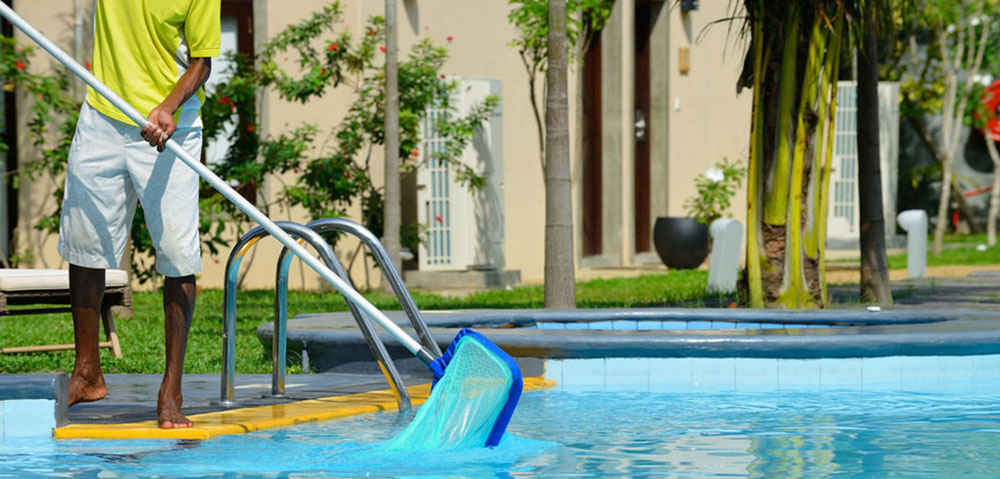 Image source: Total pool service riverside ca
Image source: Total pool service riverside ca
If you want blue pool water, one of the easiest things to do is brush down your swimming pool. Brushing your pool prevents algae from growing and it clears up dirt. The particles will float to the top of the pool, ending up in the filtration system.
You’ll only need to brush your pool for ten minutes a day to prevent cloudy pool water. Brushing your pool will prevent calcium scale from building up and will prolong the life of your pool surface.
Drain your pool
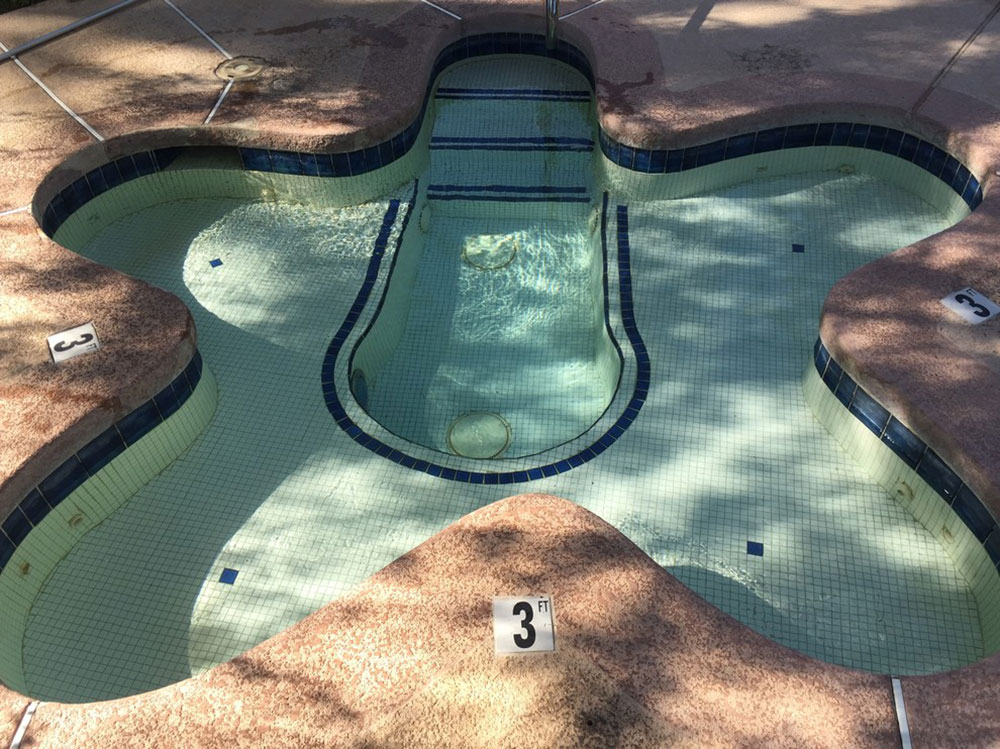 Image source: Swimming Pool Science
Image source: Swimming Pool Science
If you have a drain at the bottom of your swimming pool, this will help you to get rid of dust or debris at the bottom of the pool. A bottom drain is not actually a drain, in that it does not release water from your pool and into the water system. Instead, it circulates water to your pool’s filtration system.
If you don’t have a bottom drain, you can turn your manual vacuum cleaner upside down. This will circulate the pool water, sending debris from the bottom of the pool up towards the surface. Your debris will be sucked into the filter system with this quick and easy cloudy pool fix.
Which pool filter is best for my pool?
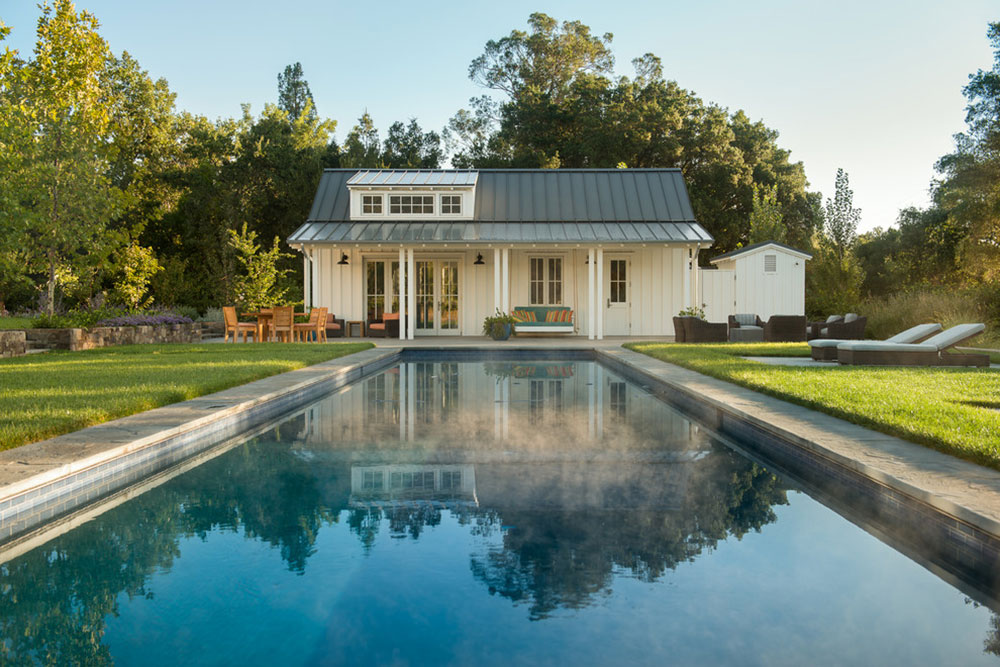 Example of how it should look by Moller Architecture, Inc.
Example of how it should look by Moller Architecture, Inc.
If your pool is still cloudy after shocking, you may wonder what filter system is best. There are three types of filters: DE (diatomaceous earth), cartridge and sand. Each filter has its own benefits. DE filters are great for filtration, followed by cartridge filters and sand filters.
Here is a short description of different pool filters and what would suit your swimming pool. Selecting the right pool filter will help you to prevent dirty pool water.
Private pools
If you have a private swimming pool, a DE filter or cartridge filter will help you to get blue pool water. Keep in mind though that these filters will need frequent replacement. This will prevent murky pool water.
Public pools
If you have a public or semi public pool, the large amount of traffic and debris will clog up the pool filter. This will mean the pool won’t clear up even when the filter system has been on. Use a sand filter, replacing the sand at least once a year to prevent it from becoming clogged with debris.
Remove foreign particles, scrub and vacuum the pool
Now that you have assessed your pool, restored chemical balance and ensured your filtration system is working at oan ptimal level, here are some tips on how to clear a cloudy pool:
Foreign particles: dust, debris and sun tan lotion often accumulate in your pool, blocking up your filtration system. Remove visible particles using a pool net. If you have cloudy pool water but no visible particles, pool water clarifier can be used. This will help you to clear a cloudy swimming pool. You can also use a pool flocculent, which will combine particles and send them to the bottom of the pool for vacuuming.
Scrubbing your pool: helps to create sparkling water. Algae can cause cloudy pool water even at the earliest stages of its growth. By scrubbing off dust particles and algae when your pool is cloudy you will help to treat the problem. Then shock your pool to balance out chemicals.
Should I use algaecide?
 Example of how it should look by SmartHouse Integration LLC
Example of how it should look by SmartHouse Integration LLC
You could use algaecide if your pool is cloudy. However, it is much easier to scrub your pool walls, catch stray pieces of algae in a large net and then vacuum. Kill any excess algae with a chlorine shock.
You could always use algaecide for prevention or during the early stages of algae growth. However, once your algae are in a developed stage, algaecide is not that effective. Rebalancing your pool chemicals will prevent algae growth as well as cloudy pool water.
Too many people use my pool
If you’re having a holiday season or just had many friends, you may be asking “Why is my pool cloudy?” Sun tan lotion, skin oils, urine or debris brought into the pool by many different swimmers may put pressure on your pool filter. If this has happened to you, run your pool filter for a longer period of time, check your chemical balance, and if your chlorine levels are okay, shock your pool with a non-chlorine shock. Use a pool clarifier to remove additional debris.
Get your pool to sparkle again
If you have cloudy swimming pool water and you want your pool to sparkle, follow these steps:
Deep clean:
Brush down and then vacuum your swimming pool in order to remove debris. Remove all floating debris with a pool net or skimmer. This is the first step to clearing up cloudy pool water.
Shock your pool
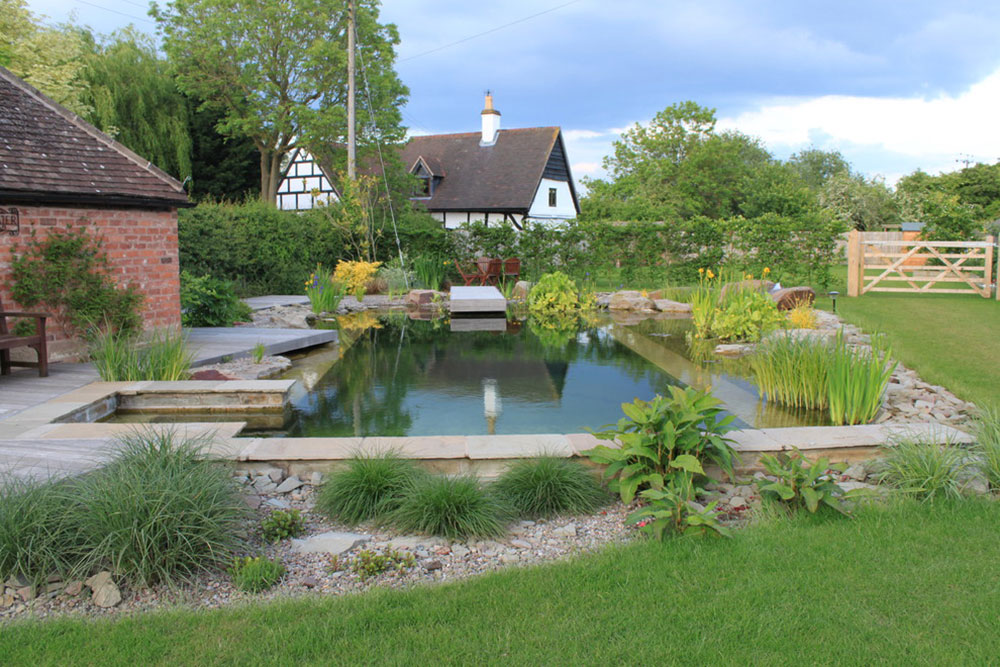 Example of how it should look by Creative Environments
Example of how it should look by Creative Environments
If you have debris or bacteria in your pool, shock your pool. A pool shocker is a heavy dose of chlorine which should restore your natural balance. If your chlorine levels are good, or you have a non-chlorinated pool, use a chlorine free shocker to help clean your swim pool water.
If you need to shock due to algae, you will need a double or triple dose, depending on the type of algae in your pool.
Filter, filter, filter:
Once you’ve shocked your pool, it is time to filter your water. This should get rid of any extra debris. Ensure your filter is clean and unblocked before you begin, and then run your filter for at least 8 to 10 hours. This will help you to clear up cloudy swimming pool water.
FAQs
I closed my pool up for winter and now have cloudy pool water. Why is this?
When you close up your pool for winter, you may end up with imbalanced chemicals. Check for algae. If your pool is cloudy but algae free, all you need to do is restore the chemical balance. Begin with your pH balance, and then add some chlorine. This should result in sparkling blue pool water.
If your pool has debris, use a pool clarifier and then skim the surface of your pool. Run your filtration system. This should clear up cloudy swimming pool water. If you prefer, you could use a pool flocculent and then vacuum away any debris that settles to the bottom of your pool.
I have shocked my pool or added algaecide but it is still cloudy. Why is this?
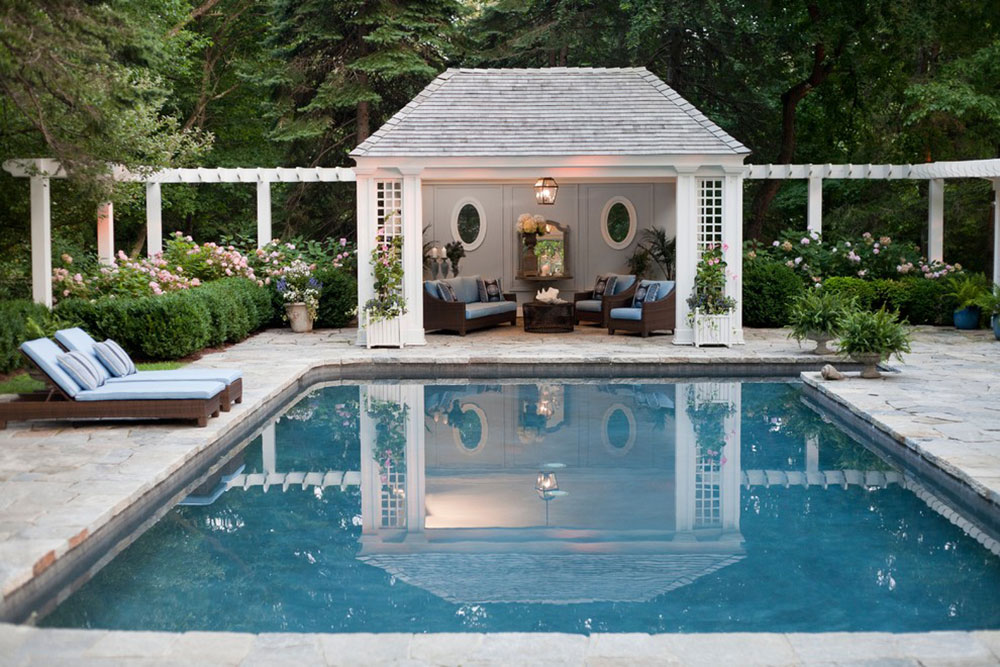 Example of how it should look by J. Brandon Jones
Example of how it should look by J. Brandon Jones
It is normal to have a cloudy pool after shock treatment. Your milky pool water should clear up after a day or so. Algaecide can make your pool water cloudy as it contains copper. Run your pool filter for 8 to 10 hours after treatment. This should help you to clarify your pool. Remember to ensure that your filter has been cleaned out and is running effectively.
If you still have cloudy pool water after 24 hours, it is possible that your shock treatment was not strong enough. Check your chlorine levels and then do another shock.
My pool is cloudy after rain. What should I do?
Rain water dilutes your pool chemicals. It also brings dust, mud and phosphates which contaminate your water and may even encourage algae. If you have phosphates in your water, you will have a cloudy pool even before algae has started to grow.
If you know that a storm is brewing, add extra chlorine to your water to make up for the dilution which comes with rain water. Turn on your pool’s circulation system while it rains. This will help to remove dust, debris and phosphates from your water. This way you won’t have a cloudy swimming pool.
Why is my pool cloudy even though my pool chemicals are balanced?
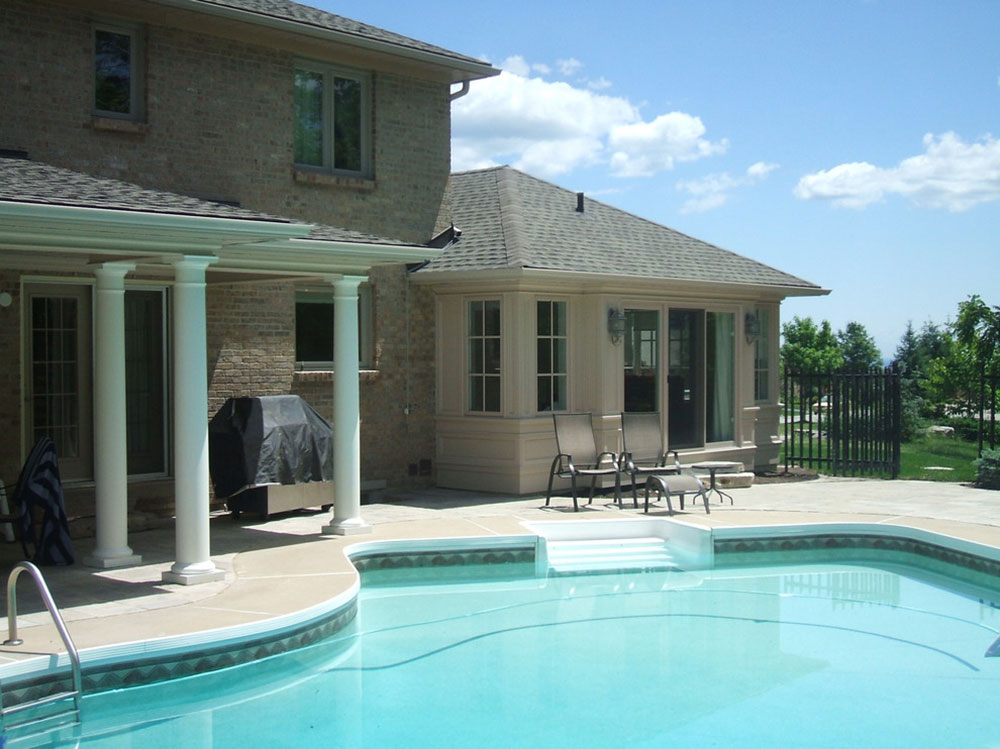 Example of how it should look by Michael DeJong Homes
Example of how it should look by Michael DeJong Homes
If you have checked your chemical balance and it is accurate, but your pool is cloudy, there is a chance that you have debris in your water. Add a pool clarifier. This will bring together debris so that you can easily remove it from the surface of the water. Run your pool filter to remove any excess particles.
Will baking soda clear up a cloudy pool?
No! Baking soda will not clear up cloudy swimming pool water. Instead, it will increase your pool’s pH level. This will actually cause cloudy pool water.
Some people may tell you to use baking soda if you have milky pool water and your alkalinity level is high. However, it is far better to use chlorine than baking soda in your pool. Chlorine will give you stable and tested results.
Is it safe to swim in cloudy or murky pool water?
 Example of how it should look by Hamptons Habitat Enterprises Corp.
Example of how it should look by Hamptons Habitat Enterprises Corp.
If your pool water is cloudy, you shouldn’t swim in it. There are various reasons for this:
Visibility: if your pool water is cloudy you won’t be able to see. This could mean that you bump into other swimmers, cannot gauge the bottom of the pool or may not be able to spot swimmers struggling in the water.
Bacteria: cloudy pools contain bacteria which can irritate the eyes or stomach, and may result in urine infections. If you have cloudy swimming pool water, it may contain E.coli.
Hygiene: cloudy swimming pool water may contain urine particles, body oils or sun tan lotion. These particles are often unhygienic and best avoided. Wait until your pool water is clear before swimming again.
Ending thoughts on cleaning a cloudy pool water
Cleaning a cloudy pool is not a hard task. We hope this guide has helped you with how to clear a cloudy pool. You may need to use pool chemicals to restore a balance to your water. You may also need to put time and effort into brushing, skimming or vacuuming your pool.
You can prevent cloudy pool water by monitoring your chemical balance and ensuring your filter system is regularly cleaned and maintained. Brush your pool regularly, add clarifier after lots of use, and prepare for storms by adding extra chlorine. This will prevent your pool water from becoming cloudy. You’ll be able to enjoy sparkling water during hot summer days.
If you liked this article about fixing your cloudy pool water, you should check out these as well:
- Swimming pool leak detection: How to find a leak in a pool
- DIY pool: How to build a natural swimming pool
- Outdoor Pool Designs That You Would Wish They Were Around Your House
- Small pools: inground, fiberglass, backyard pool designs
- Pros And Cons Of Having A Swimming Pool In Your Yard
- Best 46 Indoor Swimming Pool Design Ideas For Your Home
- Pool maintenance tips and ideas
- Outside Swimming Pool Design And Landscaping Ideas
- How much value does a pool add to a home?
The post Cloudy swimming pool water: How to clear cloudy pool water fast appeared first on Impressive Interior Design.
source https://www.impressiveinteriordesign.com/cloudy-swimming-pool/
No comments:
Post a Comment